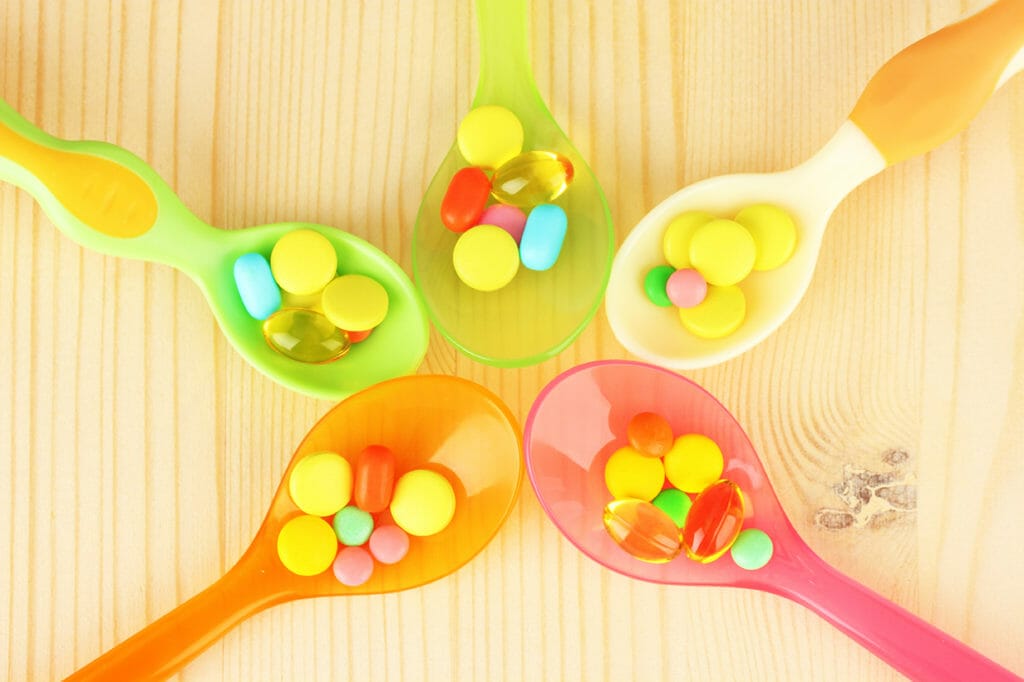The whole country is now “back to school”, well for the time being anyway, and the topic of children’s brain health, as well as their immune health, is something for all parents/carers to consider. During the pandemic, many of us had substantially more one-on-one time with our children. And it has not been limited to the typical activities, suddenly, there was the job of teaching as well. Getting kids to do their homework and stay on task seemed like a struggle back in years gone by but took on a whole new meaning in 2020.
Herein, we look at key nutrients that support children’s brain health and, with this, a healthy attention span.

Childhood Nutritional Deficiencies
Nutrient deficiencies are prevalent in children worldwide, with iron, vitamin B6, vitamin D, folate, iodine, and zinc deficiencies being among the most common in developed regions.[1],[2],[3] A 2017 review of nutritional deficiencies in U.S. children reported that, in addition to these deficiencies, vitamins A, C, and E; calcium; and magnesium are also under-consumed.[4] Though all children are at risk, the incidence of nutritional deficiency is especially high in children from low-income backgrounds and regions.
These nutritional deficiencies can lead to a host of health problems, including anaemia, poor wound healing,[5] developmental delays,[6] increased susceptibility to infectious diseases,[7] compromised bone growth,[8] and overall poorer health outcomes in adulthood.[9] Suboptimal nutrition also predisposes children to neurocognitive deficits like attention-deficit/hyperactivity disorder (ADHD).[10],[11]
Iron deficiency is particularly common in children with ADHD. In one study, done in France, serum ferritin levels were shown to be abnormally low in 84% of children with ADHD compared to only 18% of controls.[12] Additionally, low ferritin levels were correlated with more severe ADHD symptoms and greater cognitive deficits. A 2017 meta-analysis further demonstrated an association between low ferritin levels and ADHD.[13] Low levels of iron in certain regions of the brain is also associated with poor cognitive performance in otherwise healthy youths.[14]
Iodine is another nutrient that is important for normal cognitive development. With many individuals opting for more natural salts (rather than iodized table salt) or reducing the intake of salt altogether, iodine deficiency is resurging in developed countries. Unfortunately, many of the problems related to iodine deficiency in utero and infancy affect brain development.[15] Thus, when cognitive or behavioural issues show up later in life, studies suggest they will not be fully remediated with iodine supplementation. Because of this, it is very important to ensure maternal iodine adequacy during pregnancy and breastfeeding.[16]
Inadequate iodine intake in childhood and adolescence can also lead to impaired cognitive function.[17] A 2016 study found 71.9% of 89 children with ADHD to be iodine-deficient, and further revealed a significant association between low iodine levels and hyperactivity.[18] An increased incidence of ADHD and lower intelligence quotient scores also have been shown in the offspring of mothers at risk of iodine deficiency during pregnancy.[19]
Lower levels of vitamin D have been shown in children with ADHD as well.[20] Again, a recent (2018) meta-analysis also points toward this association, finding that a lower vitamin D status is associated with an increased likelihood of ADHD.[21]
Magnesium and zinc deficiencies have also been shown in children with ADHD, and are correlated with hyperactivity, inattention, and impulsivity.[22],[23],[24] Multiple meta-analyses show a relationship between low levels of these minerals and ADHD as well.[25],[26],[27]
In addition to these many vitamins and minerals, numerous studies have shown lower blood levels of omega-3 fatty acids and a heightened amount of oxidative stress in individuals with ADHD.[28],[29] Healthy children who have low levels of docosahexaenoic acid (DHA) have been shown to have a below-average reading ability, diminished working memory performance, and increased oppositional behaviour and emotional liability.[30]

Nutrients with Therapeutic Evidence
Although a nutritional deficiency state should be remedied for a multitude of reasons, correcting it does not necessarily mean it will resolve the characteristic behaviours of ADHD or improve cognitive function in general. Additionally, depending on the deficiency’s duration and the developmental stage during which it occurred, certain changes may not be reversible. Thus, we must also consider what research supports each of these as a therapeutic.
Iron
In children, the Recommended Dietary Allowance (RDA) of iron varies by age, ranging from 7 to 11 mg per day. Higher doses are often used to resolve iron deficiency, but before this course of therapy is embarked upon, testing must be done to assess for deficiency. In children with ADHD and low ferritin levels (25.9 +/- 9.2 ng/mL), supplementation with 5 mg/kg/day of an iron preparation for 30 days improved ferritin status to 44.6 +/- 18 ng/mL and significantly improved Conners’ Rating Scale (CRS) scores given by parents; however, scores given by the teacher were not improved.[31] In another study, non-anaemic children with ADHD and serum ferritin levels lower than 30 ng/mL were treated with 80 mg/day of ferrous sulphate (20% elemental iron) or placebo for 12 weeks.[32] Although there were improvements in both the parent and teacher CRS scores, improvements were not significant (P = 0.055 and 0.076, respectively). The small size of this study (N = 23) likely was a factor in the lack of significant findings.
In non-anaemic adolescent girls with iron deficiency, supplementation of 650 mg of ferrous sulphate twice weekly for eight weeks significantly improved test scores related to verbal learning and memory.[33] Other studies also point to some improvements in cognitive function or psychomotor development with iron supplementation.[34],[35],[36]
Iodine
The majority of studies investigating the impact of iodine supplementation on paediatric cognitive function look at iodine-repletion programs in iodine-deficient areas as opposed to routine, daily intake of a specifically prescribed amount of iodine.[37] That said, there are some studies looking at iodine as a monotherapy or in combination with other nutrients that are commonly associated with deficiencies.
In one such study of iodine-deficient youth, repletion of iodine and increased urinary iodine levels contributed to a significant improvement in mental performance after roughly a one-year period.[38] In moderately iodine-deficient children between 10 and 12 years of age, a single 400 mg bolus of oral iodine significantly improved performance scores at 24 weeks (versus placebo) related to information processing, fine motor skills, and visual problem-solving.[39] In another, similar setting, moderately iodine-deficient children (six to eight years in age) given a single 490 mg dose of oral iodized oil were observed to have improvements one year later in fluid intelligence, perceptual skills, and hand-eye coordination.[40] Finally, in a study where children’s school lunches were supplemented with a seasoning powder containing 5 mg iron, 5 mg zinc, 50 μg iodine, and 270 μg vitamin A, there was an improvement in visual recall, along with a reduction in symptoms of upper respiratory tract infection and diarrhoea, at 31 weeks.[41]
Vitamin D
Multiple studies have shown a positive impact of regular vitamin D supplementation on behavioural symptoms and cognitive function in children with ADHD. Although four of every 10 toddlers and children are deficient in vitamin D,[42] a deficiency state should be documented prior to supplementation of vitamin D that exceeds the RDA, which is 600 IU/day for children ranging from one to 17 years of age.[43]
In vitamin D–deficient children with ADHD, supplementation of 3000 IU of vitamin D3 daily for 12 weeks (in addition to methylphenidate (Ritalin) treatment) significantly improved cognitive function scores in the domains of conceptual level, inattention, hyperactivity, and impulsivity compared to baseline, while scores in these categories did not significantly improve in children receiving methylphenidate with placebo.[44] In a similar study, children with ADHD on a stable dose of methylphenidate were assigned to placebo or 50,000 IU of vitamin D3 orally each week for six weeks.[45] Demonstration of vitamin D deficiency was not required for inclusion in this study and of the participants, and 37, 42.7, and 19.8% were, respectively, shown to be vitamin D sufficient, insufficient, or deficient. In children with vitamin D insufficiency, parent CRS total and subscale scores were significantly improved compared to children in the placebo group. Compared to baseline, all CRS scores were significantly improved in the group receiving vitamin D while they were not in the placebo group. For the vitamin D group as a whole, CRS inattention sub-scores were also significantly improved compared to placebo.
Additional studies have shown improvements with vitamin D supplementation as an adjunctive to methylphenidate and in combination with daily supplemental magnesium.[46],[47]
Magnesium and Zinc
Magnesium and zinc are often under-consumed by children—particularly picky eaters or those on a restricted diet. Magnesium is probably the mineral we look to most often for “turning the circuits down”; e.g., it has therapeutic usefulness in adults for reducing anxiety, blood pressure, headaches, and muscle twitches, and it promotes relaxation and healthy sleep.[48],[49] We see similar effects in children: multiple studies have shown including 200 mg of magnesium daily in the therapeutic regime for children with ADHD improves outcomes, decreasing hyperactivity and impulsivity and improving cognitive function.[50],[51] The combination of magnesium with vitamin B6 (6 mg/kg/d and 0.6 mg/kg/d, respectively) has also been shown to be effective, improving hyperactivity, aggressiveness, and attention at school.[52]
Zinc deficiency also can be a factor in mood disorders such as anxiety and depression.[53] One consideration with zinc as a therapy is that if higher doses are taken for a prolonged period, it should be balanced at roughly a 10:1 ratio with copper.[54]
In one study, unmedicated children with ADHD were randomised to receive 150 mg of zinc sulphate (providing 40 mg of elemental zinc) or placebo for a period of 12 weeks.[55] At the end of the study period, children receiving zinc had significant improvements in hyperactive, impulsive, and impaired socialisation symptoms compared to the placebo group. Improvements were greatest in older children, had a higher body mass index, and/or lower pretreatment zinc or free fatty acid levels. A shorter, six-week study considered a lower, 15 mg daily dose of elemental zinc (55 mg of zinc sulphate) or placebo as an adjunctive to methylphenidate.[56] Although both groups saw improvements, as they were initially treatment naïve, significantly greater improvements in both parent and teacher scores of ADHD severity were reported in the children receiving zinc compared to placebo.
Omega-3 Fatty Acids
In addition to these essential vitamins and minerals that have systemic implications when there is a deficiency, the omega-3 fatty acids docosahexaenoic acid (DHA) and eicosapentaenoic acid (EPA) are essentially important to the health of every cell in the body. They have importance for the fatty tissues of the brain where they are found at high levels and impact not only inflammation and cellular membrane function but also neurotransmission.[57],[58],[59]
By far, the greatest amount of clinical studies on nutritional interventions in children with ADHD consider the use of omega-3 fatty acids. Omega-3 supplements, typically sourced from fish such as salmon, sardines, anchovies, or mackerel, have a high safety profile in individuals of all ages.[60],[61]
Numerous systemic reviews and meta-analyses have looked at the impact of omega-3s on the cognitive and behavioural performance of children with ADHD. A 2018 publication reviewing randomised, controlled trials found that omega-3 supplementation significantly improved clinical symptom scores and cognitive measures associated with attention in youths with ADHD.[62] A larger, 2015 review that also included healthy, typically developing youth found that omega-3 supplementation improved short-term memory in those with low omega-3 status.[63] An additional review found improved literacy, attention, and parent-rated behaviour to be associated with increased blood levels of DHA + EPA.[64] Doses of the essential fatty acids in these studies were typically 250 to 500 mg/day for several weeks to months, although some were as high as 1,300 mg/day.
Although not all studies have shown better outcomes with omega-3s as an adjunctive to methylphenidate (Ritalin), some have. Additionally, when omega-3s were used in combination with methylphenidate, a lower dose of the medication was needed to achieve the same level of clinical improvement as those using the medication alone.[65] Despite these mixed findings, given omega-3 fatty acids’ high level of tolerability and greater safety, they are important to consider, particularly in children and adolescents with low levels of dietary intake.

A Comprehensive Approach
Typically, the best way to ensure that nutritional needs are being met in children, especially picky eaters, is with a quality multivitamin and mineral supplement. A 2017 meta-analysis supports this, concluding, “Eight of ten trials assessing fluid intelligence reported significant positive effects of micronutrient supplementation among micronutrient-deficient children, especially those who were iron-deficient or iodine-deficient at baseline.”[86] In times of additional life challenges, it is also important to note that increased intake of many of these nutrients has a positive effect on mental health, improving depression, anxiety, and related behaviours.[87],[88],[89],[90] Beyond this, the additional nutrients with clinical research should be considered, often starting with omega-3 fatty acids due to the high level of evidence of their therapeutic value.
https://nutrigold.co.uk/childs-play-x-60-capsules.html – Nutrigold Children’s Multi is a multi-nutrient formulation designed specifically for children with a small capsule size for easy swallowing.
https://nutrigold.co.uk/epa-marine-fish-oil-x-60-softgels.html – Our Fish Oils includes a mix of marine species including sardines, anchovy and mackerel which are sustainably sourced from Friend of the Sea (FoS) fisheries. FoS ensure a responsible supply chain including no overfishing, no by-catch or endangered species and no illegal, unreported or unregulated fish.
References
[1] Suskind DL, et al. Nutritional deficiencies during normal growth. Pediatr Clin North Am. 2009 Oct;56(5):1035-53. [2] Kaganov B, et al. Suboptimal Micronutrient Intake among Children in Europe. Nutrients. 2015 May 13;7(5):3524-35. [3] Corbo MD, Lam J. Zinc deficiency and its management in the pediatric population: a literature review and proposed etiologic classification. J Am Acad Dermatol. 2013 Oct;69(4):616-624.e1. [4] Bird JK, et al. Risk of Deficiency in Multiple Concurrent Micronutrients in Children and Adults in the United States. Nutrients. 2017 Jun 24;9(7). [5] Schleicher RL, et al. Serum vitamin C and the prevalence of vitamin C deficiency in the United States: 2003-2004 National Health and Nutrition Examination Survey (NHANES). Am J Clin Nutr. 2009 Nov;90(5):1252-63. [6] Black MM, et al. Effects of vitamin B12 and folate deficiency on brain development in children. Food Nutr Bull. 2008 Jun;29(2 Suppl):S126-31. [7] Bhaskaram P. Micronutrient malnutrition, infection, and immunity: an overview. Nutr Rev. 2002;60(suppl 5):S40-5. [8] Gat-Yablonski G, et al. Nutrition and bone growth in pediatrics. Endocrinol Metab Clin North Am. 2009;38:565-86. [9] Haimi M, Lerner A. Nutritional deficiencies in the pediatric age group in a multicultural developed country, Israel. World J Clin Cases. 2014 May 16;2(5):120-5. [10] Fanjiang G, Kleinman RE. Nutrition and performance in children. Curr Opin Clin Nutr Metab Care. 2007;10(3):342-7. [11] Sha’ari N, et al. Nutritional status and feeding problems in pediatric attention deficit-hyperactivity disorder. Pediatr Int. 2017 Apr;59(4):408-15. [12] Konofal E, et al. Iron deficiency in children with attention-deficit/hyperactivity disorder. Arch Pediatr Adolesc Med. 2004 Dec;158(12):1113-5. [13] Wang Y, et al. Iron Status in Attention-Deficit/Hyperactivity Disorder: A Systematic Review and Meta-Analysis. PLoS One. 2017 Jan 3;12(1):e0169145. [14] Larsen B, et al. Longitudinal Development of Brain Iron Is Linked to Cognition in Youth. J Neurosci. 2020 Feb 26;40(9):1810-8. [15] Velasco I, et al. Iodine as Essential Nutrient during the First 1000 Days of Life. Nutrients. 2018 Mar 1;10(3). [16] Puig-Domingo M, Vila L. The implications of iodine and its supplementation during pregnancy in fetal brain development. Curr Clin Pharmacol. 2013 May;8(2):97-109. [17] Zimmermann MB. Iodine deficiency. Endocr Rev. 2009 Jun;30(4):376-408. [18] Kanık Yüksek S, et al. Evaluation of iodine deficiency in children with attention deficit/hyperactivity disorder. J Clin Res Pediatr Endocrinol. 2016;8(1):61-6. [19] Vermiglio F, et al. Attention deficit and hyperactivity disorders in the offspring of mothers exposed to mild-moderate iodine deficiency: a possible novel iodine deficiency disorder in developed countries. J Clin Endocrinol Metab. 2004 Dec;89(12):6054-60. [20] Kamal M, et al. Is high prevalence of vitamin D deficiency a correlate for attention deficit hyperactivity disorder? Atten Defic Hyperact Disord. 2014 Jun;6(2):73-8. [21] Khoshbakht Y, et al. Vitamin D Status and Attention Deficit Hyperactivity Disorder: A Systematic Review and Meta-Analysis of Observational Studies. Adv Nutr. 2018 Jan 1;9(1):9-20. [22] Kozielec T, Starobrat-Hermelin B. Assessment of magnesium levels in children with attention deficit hyperactivity disorder (ADHD). Magnes Res. 1997 Jun;10(2):143-8. [23] Elbaz F, et al. Magnesium, zinc and copper estimation in children with attention deficit hyperactivity disorder (ADHD). Egyptian J Med Human Genetics. 2017;18(2):153-63. [24] El-Bakry A, et al. Zinc deficiency in children with attention-deficit hyperactivity disorder. Egyptian J Psych. 2019 May 1;40(2):95. [25] Effatpanah M, et al. Magnesium status and attention deficit hyperactivity disorder (ADHD): A meta-analysis. Psychiatry Res. 2019 Apr;274:228-34. [26] Huang YH, et al. Significantly lower serum and hair magnesium levels in children with attention deficit hyperactivity disorder than controls: A systematic review and meta-analysis. Prog Neuropsychopharmacol Biol Psychiatry. 2019 Mar 2;90:134-41. [27] Sun GX, et al. [Relationship between serum zinc levels and attention deficit hyperactivity disorder in children]. Zhongguo Dang Dai Er Ke Za Zhi. 2015 Sep;17(9):980-3. [28] Hawkey E, Nigg JT. Omega-3 fatty acid and ADHD: blood level analysis and meta-analytic extension of supplementation trials. Clin Psychol Rev. 2014 Aug;34(6):496-505. [29] Joseph N, et al. Oxidative Stress and ADHD: A Meta-Analysis. J Atten Disord. 2015 Nov;19(11):915-24. [30] Montgomery P, et al. Low blood long chain omega-3 fatty acids in UK children are associated with poor cognitive performance and behavior: a cross-sectional analysis from the DOLAB study. PLoS One. 2013 Jun 24;8(6):e66697. [31] Sever Y, et al. Iron treatment in children with attention deficit hyperactivity disorder. A preliminary report. Neuropsychobiology. 1997;35(4):178-80. [32] Konofal E, et al. Effects of iron supplementation on attention deficit hyperactivity disorder in children. Pediatr Neurol. 2008 Jan;38(1):20-6. [33] Bruner AB, et al. Randomised study of cognitive effects of iron supplementation in non-anaemic iron-deficient adolescent girls. Lancet. 1996 Oct 12;348(9033):992-6. [34] Thompson J, et al. Effects of daily iron supplementation in 2- to 5-year-old children: systematic review and meta-analysis. Pediatrics. 2013 Apr;131(4):739-53. [35] Falkingham M, et al. The effects of oral iron supplementation on cognition in older children and adults: a systematic review and meta-analysis. Nutr J. 2010 Jan 25;9:4. [36] Szajewska H, et al. Effects of iron supplementation in nonanemic pregnant women, infants, and young children on the mental performance and psychomotor development of children: a systematic review of randomized controlled trials. Am J Clin Nutr. 2010 Jun;91(6):1684-90. [37] Melse-Boonstra A, Jaiswal N. Iodine deficiency in pregnancy, infancy and childhood and its consequences for brain development. Best Pract Res Clin Endocrinol Metab. 2010 Feb;24(1):29-38. [38] van den Briel T, et al. Improved iodine status is associated with improved mental performance of schoolchildren in Benin. Am J Clin Nutr. 2000 Nov;72(5):1179-85. [39] Zimmermann MB, et al. Iodine supplementation improves cognition in iodine-deficient schoolchildren in Albania: a randomized, controlled, double-blind study. Am J Clin Nutr. 2006 Jan;83(1):108-14. [40] Shrestha RM. The effect of iodine and iron supplementation on physical, psychomotor and mental development in primary school children in Malawi. [PhD thesis]. Wageningen, Netherlands: Wageningen University Division of Human Nutrition; 1994. [41] Winichagoon P, et al. A multimicronutrient-fortified seasoning powder enhances the hemoglobin, zinc, and iodine status of primary school children in North East Thailand: a randomized controlled trial of efficacy. J Nutr. 2006 Jun;136(6):1617-23. [42] American Academy of Pediatrics. Fighting Vitamin D Deficiency [Internet]. Itasca (IL): American Academy of Pediatrics; 2018 [cited 2020 Mar 17]. Available from: https://www.aap.org/en-us/about-the-aap/aap-press-room/aap-press-room-media-center/Pages/Fighting-Vitamin-D-Deficiency.aspx [43] Linus Pauling Institute. Micronutrient Information Center. Vitamin D. Corvallis (OR): Oregon State University [cited 27 March 2020]. Available from: https://lpi.oregonstate.edu/mic/vitamins/vitamin-D#RDA. [44] Elshorbagy HH, et al. Impact of Vitamin D Supplementation on Attention-Deficit Hyperactivity Disorder in Children. Ann Pharmacother. 2018 Jul;52(7):623-31. [45] Dehbokri N, et al. Effect of vitamin D treatment in children with attention-deficit hyperactivity disorder. World J Pediatr. 2019 Feb;15(1):78-84. [46] Mohammadpour N, et al. Effect of vitamin D supplementation as adjunctive therapy to methylphenidate on ADHD symptoms: A randomized, double blind, placebo-controlled trial. Nutr Neurosci. 2018 Apr;21(3):202-9. [47] Hemamy M, et al. Effect of Vitamin D and Magnesium Supplementation on Behavior Problems in Children with Attention-Deficit Hyperactivity Disorder. Int J Prev Med. 2020 Jan 24;11:4. [48] Mauskop A, et al. Intravenous magnesium sulfate rapidly alleviates headaches of various types. Headache. 1996 Mar;36(3):154-60. [49] Boyle NB, et al. The Effects of Magnesium Supplementation on Subjective Anxiety and Stress-A Systematic Review. Nutrients. 2017 Apr 26;9(5). pii: E429. [50] Starobrat-Hermelin B, Kozielec T. The effects of magnesium physiological supplementation on hyperactivity in children with attention deficit hyperactivity disorder (ADHD). Positive response to magnesium oral loading test. Magnes Res. 1997 Jun;10(2):149-56. [51] El Baza F, et al. Magnesium supplementation in children with attention deficit hyperactivity disorder. Egyptian J Med Human Genetics. 2016;17(1):63-70. [52] Mousain-Bosc M, et al. Improvement of neurobehavioral disorders in children supplemented with magnesium-vitamin B6. Mag Res. 2006 Mar 1;19(1):46-52. [53] Cope EC, Levenson CW. Role of zinc in the development and treatment of mood disorders. Curr Opin Clin Nutr Metab Care. 2010 Nov;13(6):685-9. [54] Maret W, Sandstead HH. Zinc requirements and the risks and benefits of zinc supplementation. J Trace Elem Med Biol. 2006;20(1):3-18. [55] Bilici M, et al. Double-blind, placebo-controlled study of zinc sulfate in the treatment of attention deficit hyperactivity disorder. Prog Neuropsychopharmacol Biol Psychiatry. 2004 Jan;28(1):181-90. [56] Akhondzadeh S, et al. Zinc sulfate as an adjunct to methylphenidate for the treatment of attention deficit hyperactivity disorder in children: a double blind and randomized trial [ISRCTN64132371]. BMC Psychiatry. 2004 Apr 8;4:9. [57] Shi Z, et al. Fish Oil Prevents Lipopolysaccharide-Induced Depressive-Like Behavior by Inhibiting Neuroinflammation. Mol Neurobiol. 2017 Nov;54(9):7327-34. [58] Kidd PM. Omega-3 DHA and EPA for cognition, behavior, and mood: clinical findings and structural-functional synergies with cell membrane phospholipids. Altern Med Rev. 2007 Sep;12(3):207-27. [59] Tanaka K, et al. Effects of docosahexaenoic acid on neurotransmission. Biomol Ther (Seoul). 2012 Mar;20(2):152-7. [60] Jasani B, et al. Long chain polyunsaturated fatty acid supplementation in infants born at term. Cochrane Database Syst Rev. 2017 Mar 10;3:CD000376. [61] Bohnert H, et al. Efficacy of a long-term home parenteral nutrition regimen containing fish oil-derived n-3 polyunsaturated fatty acids: a single-centre, randomized, double blind study. Nutr J. 2018 Nov 30;17(1):113. [62] Chang JP, et al. Omega-3 Polyunsaturated Fatty Acids in Youths with Attention Deficit Hyperactivity Disorder: a Systematic Review and Meta-Analysis of Clinical Trials and Biological Studies. Neuropsychopharmacology. 2018 Feb;43(3):534-45. [63] Cooper RE, et al. Omega-3 polyunsaturated fatty acid supplementation and cognition: A systematic review and meta-analysis. J Psychopharmacol. 2015 Jul;29(7):753-63. [64] Agostoni C, et al. The Role of Omega-3 Fatty Acids in Developmental Psychopathology: A Systematic Review on Early Psychosis, Autism, and ADHD. Int J Mol Sci. 2017 Dec 4;18(12). [65] Barragán E, et al. Efficacy and Safety of Omega-3/6 Fatty Acids, Methylphenidate, and a Combined Treatment in Children With ADHD. J Atten Disord. 2017 Mar;21(5):433-41. [86] Lam LF, Lawlis TR. Feeding the brain – The effects of micronutrient interventions on cognitive performance among school-aged children: A systematic review of randomized controlled trials. Clin Nutr. 2017 Aug;36(4):1007-14. [87] Herbison CE, et al. Low intake of B-vitamins is associated with poor adolescent mental health and behaviour. Prev Med. 2012 Dec;55(6):634-8. [88] Black LJ, et al. Low dietary intake of magnesium is associated with increased externalising behaviours in adolescents. Public Health Nutr. 2015 Jul;18(10):1824-30. [89] Smith DJ, et al. Adjunctive low-dose docosahexaenoic acid (DHA) for major depression: An open-label pilot trial. Nutritional neuroscience. 2018 Mar 16;21(3):224-8. [90] Högberg G, et al. Depressed adolescents in a case‐series were low in vitamin D and depression was ameliorated by vitamin D supplementation. Acta Paediatrica. 2012 Jul;101(7):779-83.






